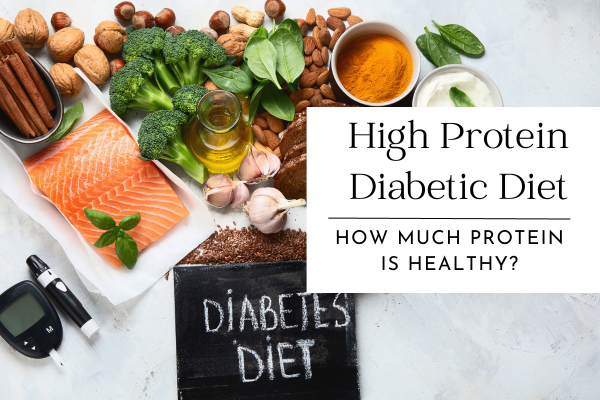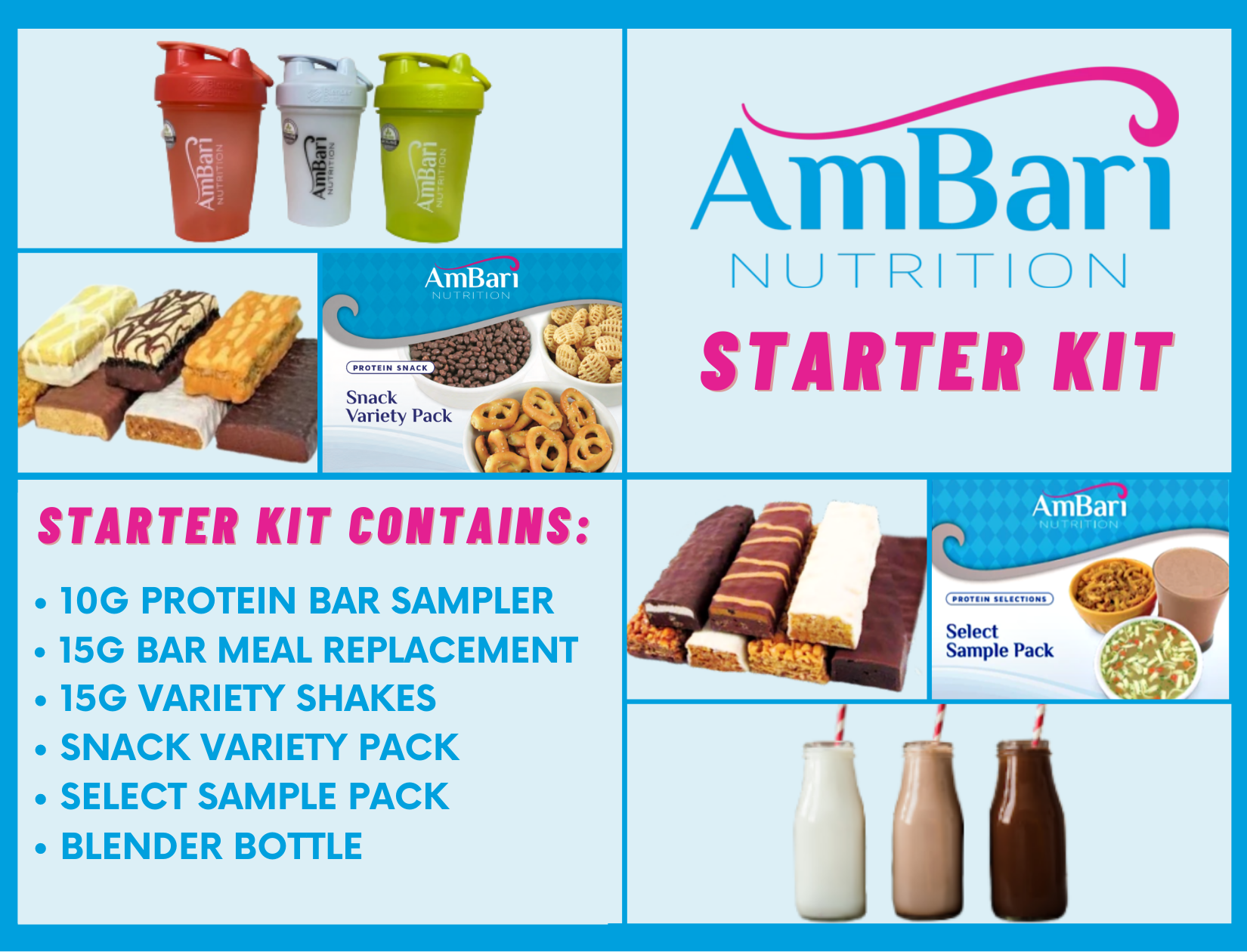Menu
Your cart is empty
Looks like you haven't added anything to your cart yet

High Protein Diabetic Diet: How Much Protein is Healthy?
A well-planned and well-balanced diet takes center stage when talking about diabetes management. The right diet not only helps individuals control their diabetes but also helps improve their overall well-being and energy levels.
In all the commotion about maintaining carbohydrate intake, it’s easy for protein to be overshadowed, often taking a back seat in conversations about diabetes and meal planning.
However, protein assumes a substantial and multifaceted role in promoting health and well-being for individuals managing diabetes. Within our bodies, protein serves as a building block, forming the foundation for organs, muscles, the nervous system, blood vessels, and even our skeletal structure.
This understanding has paved the way for the development and adoption of high-protein diabetic diets, but as we go down that path, a fundamental question inevitably arises — How much protein is healthy for diabetics? Research and studies have suggested a limit.
Understanding Diabetes
The two most common forms of diabetes are Type 1 and Type 2. Type 1 diabetes is a result of an autoimmune condition where the body’s immune system ends up destroying the cells in the pancreas that are responsible for producing insulin.
Type 2 diabetes is usually associated with obesity and an unhealthy lifestyle. In both forms of chronic disease, the body is unable to regulate blood glucose on its own. This is where medications come in, which help the body in regulating blood sugar. As important as medication is, it is diet management that allows people with diabetes to reduce the risks that come with the condition.
The Role of Protein in A Diabetic Diet
Protein is one of the most essential nutrients found in our cells and bloodstream. Not only does it contribute to growth, energy, maintenance, and chemical reactions. It is also a building block for our bones, hair, nails, and skin. When it comes to diabetes management, protein’s presence is essential for the following reasons:

-
Protein Stimulates the Secretion of Insulin and Glucagon
A high-protein diabetic diet promotes the secretion of insulin and glucagon. These two hormones keep our blood glucose regulated, by keeping them from rising too high or dropping too low.
-
Protein Intake Helps with Diabetic-Fatigue
Diabetes-related fatigue is often caused by high blood glucose. Diabetic patients can boost energy levels keeping their blood sugar stable. A high-protein diabetic diet promotes stable blood sugar. It is also one of the three primary macronutrients that provide energy, alongside carbohydrates and fats.
-
Muscle Health and Maintenance
It plays a pivotal role in fostering the growth of new tissue, facilitating the development of muscle mass, and aiding in the repair of bodily damage.
A study conducted in 2021 revealed that out of all the diabetic individuals in a group of 23,487 who didn’t meet the recommended protein intake, 52% showed physical limitations. The study highlighted that low protein intake in diabetics can lead to muscle loss, falls, functional limitations, and sarcopenia, given the fact that protein helps in building muscles.
-
High Protein Diabetic Diet Regulates Blood Sugar
Protein's impact on blood glucose levels is relatively minor compared to carbohydrates. This is because protein plays a role in stabilizing blood sugars by slowing down the absorption of carbohydrates and sugars. In fact, research has demonstrated that a high-protein diet can be beneficial for individuals with diabetes, aiding in better blood sugar control and weight reduction. This is achieved by reducing the occurrence of post-meal blood sugar spikes and promoting a sense of fullness, which, in turn, reduces the likelihood of overeating and weight gain.
Read More: The Best High Protein Meal Replacements for Diabetics
The reason behind protein's ability to stabilize blood sugars lies in its slower digestion rate when compared to carbohydrates. As protein breaks down into glucose more gradually than carbohydrates, its impact on blood glucose levels unfolds over several hours. This gradual effect is instrumental in preventing the abrupt and undesirable fluctuations in blood sugar levels that can occur with the consumption of rapidly digesting carbohydrates.
How Much Protein is Healthy in a High Protein Diabetic Diet?
According to the Dietary Guidelines 2020 to 2025, the protein recommendation for individuals with diabetes closely aligns with the general population's guideline, which advises adults to consume a minimum of 0.8 grams of protein per kilogram of body weight daily, accounting for 10% to 35% of total calories. For instance, if you weigh 165 pounds (75 kilograms), this translates to a minimum daily protein target of 60 grams.
The UK Food Standards Agency has a protein intake scale based on age:
- 0 months to 1 year: 12.5 to 14.9 g
- 1 to 3 years: 14.5g
- 4 to 6 years: 19.7g
- 7 to 10 years: 28.3g
- 11 to 14 years: 42g
- 15 to 18 years: 55g
- 19 to 50 years: 55g
- Over 50 years: 53g
It's essential to note that these recommendations hold true if your kidneys are functioning healthily.
In terms of overall daily caloric distribution, around 45% to 65% of your calorie intake should constitute carbohydrates, while the remaining portion should be sourced from fat.
However, a recent study also investigated the impact of protein on individuals with Type 1 diabetes, without the intake of carbohydrates and fat. The study concluded that a high intake of protein alone, which is 75 grams, can significantly impact blood sugar levels, a few hours after eating.
What Are the Ideal Food Choices for a Diabetic Diet High in Protein?
Individuals with diabetes have a range of protein-rich foods at their disposal, however, some sources of protein are better for them than others. Here are some high-protein food sources that diabetics can safely consume to meet their daily protein intake:
- Lean meats (chicken breast and turkey breast)
- Red meat (lamb, beef, pork)
- Fish (salmon and tuna)
- Eggs
- Nuts, seeds, beans, and soy
- Dairy (Greek yogurt, low-fat milk, Swiss cheese, mozzarella cheese, and cottage cheese)
- Diabetic-friendly protein bars
- Protein shakes made for diabetics
How To Lower Blood Sugar Levels?
To effectively lower blood sugar levels, several strategies can be implemented.
Dietary Approach: One way to manage blood sugar levels is by following a low-carb diet. Carbohydrates have a significant impact on blood glucose, and evidence supports the idea that reducing carb intake can assist in stabilizing and controlling blood sugar.
Fiber-Rich Carbs: It's important to note that sugars and starches can cause blood sugar spikes, while fiber-rich carbohydrates do not. These carbs are more challenging for the body to absorb and break down. Therefore, individuals might consider incorporating more fiber-rich foods into their diet.
Achieving a Healthy Weight: Managing diabetes can be facilitated by attaining a moderate weight, although the ideal range varies for each person. Seeking guidance from a doctor can help determine an appropriate weight goal.
Staying Physically Active: Regular physical activity provides numerous health benefits, including blood sugar management. Exercise enhances insulin sensitivity, enabling muscles to efficiently utilize glucose for energy. This leads to short-term reductions in blood sugar levels and, over time, can contribute to lower A1C test results.

Frequently Asked Questions
Q) Is High Protein Diet A Threat to Our Kidneys?
A high-protein diet is not a threat to fully functioning kidneys and therefore, there’s no need for such individuals to limit their protein intake. You can further protect your kidneys by monitoring your glucose levels and your blood pressure and keeping both in the target range.
A study suggests that high dietary protein intake can cause intraglomerular hypertension, which may result in kidney hyperfiltration, glomerular injury, and proteinuria.
Q) Is Extra Insulin Needed for High-Protein Meals?
The need for extra insulin when consuming high-protein meals depends on various factors, including an individual's insulin sensitivity, the amount and type of protein consumed, and overall dietary composition. While carbohydrates typically have the most significant impact on blood sugar levels, protein can also affect insulin requirements, albeit to a lesser extent.
Studies suggest that the addition of 30% more insulin to a standard dose for a high-protein meal.
It should be noted that the body's insulin response to protein-rich foods can vary among individuals. Some people may experience a slight increase in blood sugar after consuming high-protein meals, which could necessitate a modest adjustment in insulin dosage. However, for many individuals, especially those with well-controlled diabetes, the impact of protein on blood sugar may not be substantial enough to warrant additional insulin.
People with diabetes need to monitor their blood sugar levels regularly and work closely with healthcare professionals to determine the appropriate insulin dosage for their specific dietary choices and needs.
When It Comes To Diabetic Nutrition Concerns, AmBari Nutrition Is Your Trusted Source!
A high-protein diet can be a valuable ally in the ongoing battle against diabetes. Its ability to help stabilize blood sugar levels, boost energy, preserve muscle health, and support overall well-being underscores its significance in diabetes management.
By making thoughtful dietary choices and consulting with healthcare professionals and dietitians, individuals with diabetes can leverage the power of a high-protein diet to enhance their quality of life and effectively manage their condition.
At AmBari Nutrition, our experts will help you find nutritionally balanced foods that are ideal for diabetic patients. For more information, call us at (888) 444-7120.
References:
https://www.splenda.com/blog/the-importance-of-protein-for-people-with-diabetes/
https://diatribe.org/protein-and-diabetes-what-you-need-know
https://www.verywellhealth.com/how-much-protein-should-a-person-with-diabetes-eat-2506615#citation-1
https://www.diabetes.co.uk/nutrition/protein-and-diabetes.html
https://www.healthcentral.com/condition/diabetes/diabetes-fatigue
https://www.verywellhealth.com/how-much-protein-should-a-person-with-diabetes-eat-2506615
Writer: Carrie H. Carrie is a dedicated health and nutrition writer with a strong background in medical and scientific research. She is driven by a passion for helping others lead healthier lives, diving into the latest scientific research. Combining evidence-based knowledge with practical advice, Carrie strives to provide accurate and valuable information on health, nutrition, and wellness. Her ultimate aim is to empower readers, enabling them to make informed choices about their well-being. |
Reviewed By: Dr. Kevin Huffman Dr. Kevin D. Huffman, D.O., is a leading board-certified bariatric physician with extensive expertise in treating obesity. He has trained countless healthcare providers and founded American Bariatric Consultants to develop protocols and training materials sought by medical societies, pharmaceutical companies, patients, and hospitals. Dr. Huffman's impact extends beyond patient care as he prepares physicians for board certification, expanding access to this vital treatment. |
- Choosing a selection results in a full page refresh.




































